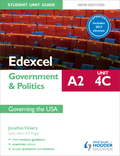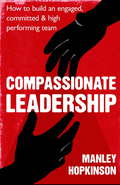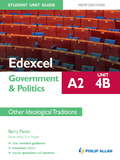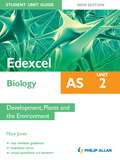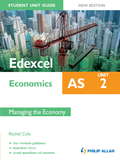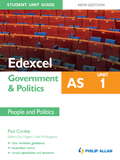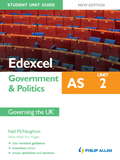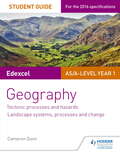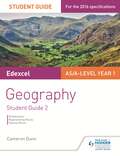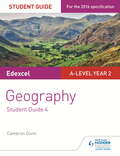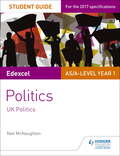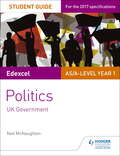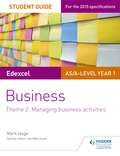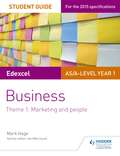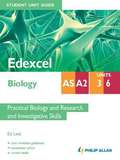- Table View
- List View
Edexcel A2 Government & Politics Student Unit Guide New Edition: Governing the USA
by Jonathan VickeryExam Board: EdexcelLevel: A2Subject: Government & PoliticsFirst Teaching: September 2012First Exam: June 2014Perfect for revision, this updated guide explains the unit requirements, summarises the content and includes specimen questions with graded answers.This full-colour New Edition Student Unit Guide provides ideal preparation for your unit exam:- Feel confident you understand the unit: the guide comprehensively covers the unit content and includes topic summaries, knowledge check questions and a reference index- Use up-to-date examples: fully updated in line with the 2012 US Presidential Election- Get to grips with the exam requirements: the specific skills on which you will be tested are explored and explained
Edexcel A2 Government & Politics Student Unit Guide New Edition: Governing the USA
by Jonathan VickeryPerfect for revision, this updated guide explains the unit requirements, summarises the content and includes specimen questions with graded answers. This full-colour New Edition Student Unit Guide provides ideal preparation for your unit exam: - Feel confident you understand the unit: the guide comprehensively covers the unit content and includes topic summaries, knowledge check questions and a reference index - Use up-to-date examples: fully updated in line with the 2012 US Presidential Election - Get to grips with the exam requirements: the specific skills on which you will be tested are explored and explained
Edexcel A2 Government & Politics Student Unit Guide New Edition: Unit 4B Other Ideological Traditions
by Barry PavierWritten by a senior examiner, Barry Pavier, this EdexcelA2 Government & Politics Student Unit Guide is the essential studycompanion for Unit 4B: Other Ideological Traditions; clearguidance on the content of the unit, with topic summaries, knowledge checkquestions and a quick-reference index examiner's advice throughout,so you will know what to expect in the exam and will be able to demonstrate theskills requiredexam-style questions, with graded studentresponses, so you can see clearly what is required to get a better grade.
Edexcel AS Biology Student Unit Guide New Edition: Unit 2 Development, Plants and the Environment
by Mary JonesWritten by a senior examiner, Mary Jones, this Edexcel AS Biology Student Unit Guide is the essential study companion for Unit 2: Development, Plants and the Environment.This full-colour book includes all you need to know to prepare for your unit exam: clear guidance on the content of the unit, with topic summaries, knowledge check questions and a quick-reference index examiner's advice throughout, so you will know what to expect in the exam and will be able to demonstrate the skills required exam-style questions, with graded student responses, so you can see clearly what is required to get a better grade
Edexcel AS Chemistry Student Unit Guide New Edition: Unit 1 The Core Principles of Chemistry
by George Facer Rod BeavonWritten by a senior examiner, Rod Beavon, and revised by George Facer, this Edexcel AS Chemistry Student Unit Guide is the essential study companion for Unit 1: The Core Principles of Chemistry.This full-colour book includes all you need to know to prepare for your unit exam: Clear guidance on the content of the unit, with topic summaries, knowledge check questions and a quick-reference index Examiner's advice throughout, so you will know what to expect in the exam and will be able to demonstrate the skills required Exam-style questions, with graded student responses, so you can see clearly what is required to get a better grade
Edexcel AS Chemistry Student Unit Guide New Edition: Unit 2 Application of Core Principles of Chemistry
by George Facer Rod BeavonWritten by a senior examiner, Rod Beavon, and revised by George Facer, this Edexcel AS Chemistry Student Unit Guide is the essential study companion for Unit 2: Application of Core Principles of Chemistry.This full-colour book includes all you need to know to prepare for your unit exam: clear guidance on the content of the unit, with topic summaries, knowledge check questions and a quick-reference index examiner's advice throughout, so you will know what to expect in the exam and will be able to demonstrate the skills required exam-style questions, with graded student responses, so you can see clearly what is required to get a better grade
Edexcel AS Economics Student Unit Guide: Unit 2 New Edition Managing the Economy
by Rachel ColeWritten by a senior examiner, Rachel Cole, this Edexcel AS Economics Student Unit Guide is the essential study companion for Unit 2: Managing the Economy. This full-colour book includes all you need to know to prepare for your unit exam: clear guidance on the content of the unit, with topic summaries, knowledge check questions and a quick-reference index, examiner's advice throughout, so you will know what to expect in the exam and will be able to demonstrate the skills required and exam-style questions, with graded student responses, so you can see clearly what is required to get a better grade.
Edexcel AS Government & Politics Student Unit Guide: Unit 1 New Edition People and Politics
by Eric Magee Paul Cordey Neil McNaughtonWritten by a senior examiner, Paul Fairclough, this AQA AS Government & Politics Student Unit Guide is the essential study companion for Unit 2: Governing Modern Britain.This full-colour book includes all you need to know to prepare for your unit exam: clear guidance on the content of the unit, with topic summaries, knowledge check questions and a quick-reference index examiner's advice throughout, so you will know what to expect in the exam and will be able to demonstrate the skills required exam-style questions, with graded student responses, so you can see clearly what is required to get a better grade
Edexcel AS Government & Politics Student Unit Guide: Unit 2 New Edition Governing the UK
by Neil McNaughtonWritten by a senior examiner, Neil McNaughton, this Edexcel AS Government & Politics Student Unit Guide is the essential study companion for Unit 2: Governing the UK.This full-colour book includes all you need to know to prepare for your unit exam: clear guidance on the content of the unit, with topic summaries, knowledge check questions and a quick-reference index examiner's advice throughout, so you will know what to expect in the exam and will be able to demonstrate the skills required exam-style questions, with graded student responses, so you can see clearly what is required to get a better grade
Edexcel AS Physics Student Unit Guide New Edition: Unit 1 Physics on the Go
by Mike BennWritten by a senior examiner, Mike Benn, this Edexcel AS Physics Student Unit Guide is the essential study companion for Unit 1: Physics on the Go.This full-colour book includes all you need to know to prepare for your unit exam: clear guidance on the content of the unit, with topic summaries, knowledge check questions and a quick-reference index examiner's advice throughout, so you will know what to expect in the exam and will be able to demonstrate the skills required exam-style questions, with graded student responses, so you can see clearly what is required to get a better grade
Edexcel AS/A-level Geography Student Guide 1: Tectonic Processes and Hazards; Landscape systems, processes and change
by Cameron DunnReinforce students' geographical understanding throughout their course; clear topic summaries with sample questions and answers help students improve their exam technique and achieve their best.Written by a teacher with extensive examining experience, this guide:- Helps students identify what they need to know with a concise summary of the topics examined at AS and A-level- Consolidates understanding through assessment tips and knowledge-check questions- Offers opportunities for students to improve their exam technique by consulting sample graded answers to exam-style questions- Develops independent learning and research skills- Provides the content students need to produce their own revision notes
Edexcel AS/A-level Geography Student Guide 1: Tectonic Processes and Hazards; Landscape systems, processes and change
by Cameron DunnExam Board: EdexcelLevel: AS/A-levelSubject: GeographyFirst Teaching: September 2016First Exam: June 2017Reinforce students' geographical understanding throughout their course; clear topic summaries with sample questions and answers help students improve their exam technique and achieve their best.Written by a teacher with extensive examining experience, this guide:- Helps students identify what they need to know with a concise summary of the topics examined at AS and A-level- Consolidates understanding through assessment tips and knowledge-check questions- Offers opportunities for students to improve their exam technique by consulting sample graded answers to exam-style questions- Develops independent learning and research skills- Provides the content students need to produce their own revision notes
Edexcel AS/A-level Geography Student Guide 2: Globalisation; Shaping places
by Cameron DunnExam Board: EdexcelLevel: AS/A-levelSubject: GeographyFirst Teaching: September 2016First Exam: September 2017Reinforce students' geographical understanding throughout their course; clear topic summaries with sample questions and answers help students improve their exam technique and achieve their best.Written by a teacher with extensive examining experience, this guide:- Helps students identify what they need to know with a concise summary of the topics examined at AS and A-level- Consolidates understanding through assessment tips and knowledge-check questions- Offers opportunities for students to improve their exam technique by consulting sample graded answers to exam-style questions- Develops independent learning and research skills- Provides the content students need to produce their own revision notes
Edexcel AS/A-level Geography Student Guide 2: Globalisation; Shaping places
by Cameron DunnExam Board: EdexcelLevel: AS/A-levelSubject: GeographyFirst Teaching: September 2016First Exam: June 2017Reinforce students' geographical understanding throughout their course; clear topic summaries with sample questions and answers help students improve their exam technique and achieve their best.Written by a teacher with extensive examining experience, this guide:- Helps students identify what they need to know with a concise summary of the topics examined at AS and A-level- Consolidates understanding through assessment tips and knowledge-check questions- Offers opportunities for students to improve their exam technique by consulting sample graded answers to exam-style questions- Develops independent learning and research skills- Provides the content students need to produce their own revision notes
Edexcel AS/A-level Geography Student Guide 4: Geographical skills; Fieldwork; Synoptic skills
by David Redfern Cameron DunnReinforce students' geographical understanding throughout their course; clear topic summaries with sample questions and answers help students improve their exam technique and achieve their best.Written by a teacher with extensive examining experience, this guide:- Helps students identify what they need to know with a concise summary of the topics examined at AS and A-level- Consolidates understanding through assessment tips and knowledge-check questions- Offers opportunities for students to improve their exam technique by consulting sample graded answers to exam-style questions- Develops independent learning and research skills- Provides the content students need to produce their own revision notes
Edexcel AS/A-level Geography Student Guide: Geographical skills; Fieldwork; Synoptic skills
by David Redfern Cameron DunnReinforce students' geographical understanding throughout their course; clear topic summaries with sample questions and answers help students improve their exam technique and achieve their best.Written by a teacher with extensive examining experience, this guide:- Helps students identify what they need to know with a concise summary of the topics examined at AS and A-level- Consolidates understanding through assessment tips and knowledge-check questions- Offers opportunities for students to improve their exam technique by consulting sample graded answers to exam-style questions- Develops independent learning and research skills- Provides the content students need to produce their own revision notes
Edexcel AS/A-level Politics Student Guide 1: UK Politics
by Neil McNaughtonExam Board: EdexcelLevel: AS/A-levelSubject: PoliticsFirst Teaching: September 2017First Exam: June 2018Reinforce your understanding throughout the course. Clear topic summaries with sample questions and answers will help you improve your exam technique to achieve higher grades.Written by experienced author Neil McNaughton this Student Guide for Politics:-Identifies the key content you need to know with a concise summary of topics examined in the AS/A-level specifications-Enables you to measure your understanding with exam tips and knowledge check questions, with answers at the end of the guide-Helps you to improve your exam technique with sample answers to exam-style questions-Develops your independent learning skills with content you can use for further study and research
Edexcel AS/A-level Politics Student Guide 1: UK Politics
by Neil McNaughtonExam Board: EdexcelLevel: AS/A-levelSubject: PoliticsFirst Teaching: September 2017First Exam: June 2018Reinforce your understanding throughout the course. Clear topic summaries with sample questions and answers will help you improve your exam technique to achieve higher grades.Written by experienced author Neil McNaughton this Student Guide for Politics:-Identifies the key content you need to know with a concise summary of topics examined in the AS/A-level specifications-Enables you to measure your understanding with exam tips and knowledge check questions, with answers at the end of the guide-Helps you to improve your exam technique with sample answers to exam-style questions-Develops your independent learning skills with content you can use for further study and research
Edexcel AS/A-level Politics Student Guide 2: UK Government
by Neil McNaughtonWritten by experienced author Neil McNaughton this Student Guide for Politics:-Identifies the key content you need to know with a concise summary of topics examined in the AS/A-level specifications-Enables you to measure your understanding with exam tips and knowledge check questions, with answers at the end of the guide-Helps you to improve your exam technique with sample answers to exam-style questions-Develops your independent learning skills with content you can use for further study and research
Edexcel AS/A-level Politics Student Guide: UK Government
by Neil McnaughtonWritten by experienced author Neil McNaughton this Student Guide forfor Politics:-Identifies the key content you need to know with a concise summary of topics examined in the AS/A-level specifications-Enables you to measure your understanding with exam tips and knowledge check questions, with answers at the end of the guide-Helps you to improve your exam technique with sample answers to exam-style questions-Develops your independent learning skills with content you can use for further study and research
Edexcel AS/A-level Year 1 Business Student Guide: Managing business activities
by Mark HageReinforce your understanding throughout the course. Clear topic summaries with sample questions and answers will help you improve your exam technique to achieve higher grades.Written by experienced teacher and examiner Mark Hage this Student Guide for Business:-Identifies the key content you need to know with a concise summary of topics examined in the A-level specifications-Enables you to measure your understanding with exam tips and knowledge check questions, with answers at the end of the guide-Helps you to improve your exam technique with sample answers to exam-style questions-Develops your independent learning skills with content you can use for further study and research
Edexcel AS/A-level Year 1 Business Student Guide: Marketing and people
by Mark HageReinforce your understanding throughout the course. Clear topic summaries with sample questions and answers will help you improve your exam technique to achieve higher grades.Written by experienced teacher and examiner Mark Hage this Student Guide for Business:-Identifies the key content you need to know with a concise summary of topics examined in the A-level specifications-Enables you to measure your understanding with exam tips and knowledge check questions, with answers at the end of the guide-Helps you to improve your exam technique with sample answers to exam-style questions-Develops your independent learning skills with content you can use for further study and research
Edexcel AS/A-level Year 1 Business Student Guide: Theme 1 - Marketing And People
by Mark HageExam Board: EdexcelLevel: AS/A-levelSubject: BusinessWritten by experienced author Mark Hage, this Student Guide for Business focuses on the key topics of markets and market needs, marketing strategy and managing people.The first section, Content Guidance, summarises content needed for the exams, with knowledge-check questions throughout. The second section, Questions and Answers, provides samples of different questions and student answers with examples of how many marks are available for each question. Students can:- Identify key content for the exams with our concise summary of topics- Find out what examiners are looking for with our Questions and Answers section- Test their knowledge with rapid-fire questions and answers - Avoid common pitfalls with clear definitions and exam tips throughout- Reinforce their learning with bullet-list summaries at the end of each section
Edexcel AS/A-level Year 1 Business Student Guide: Theme 2: Managing business activities
by Mark HageExam Board: EdexcelLevel: AS/A-levelSubject: BusinessWritten by experienced author Mark Hage, this Student Guide for Business focuses on the key topics of raising finance, financial planning and resource management. The first section, Content Guidance, summarises content needed for the exams, with knowledge-check questions throughout. The second section, Questions and Answers, provides samples of different questions and student answers with examples of how many marks are available for each question. Students can:- Identify key content for the exams with our concise summary of topics- Find out what examiners are looking for with our Questions and Answers section- Test their knowledge with rapid-fire questions and answers - Avoid common pitfalls with clear definitions and exam tips throughout- Reinforce their learning with bullet-list summaries at the end of each section
Edexcel Biology AS/A2 Student Unit Guide: Units 3&6 Practical Biology and Research adn Investigative Skills ePub
by Ed LeesWritten by a senior examiner, Ed Lees, this Edexcel AS/A2 Biology Student Unit Guide is the essential study companion for Units 3 and 6: Practical Biology and Research and Investigative Skills.This full-colour book includes all you need to know to prepare for your Unit 3 and Unit 6 assessments:clear guidance on the range of practical apparatus and techniques that you need to know about and an overview of the scientific method of testing ideas by experimentationexaminer's advice throughout, so you will know what to expect in the assessments and will be able to demonstrate the skills requiredsample investigation tasks for extra practice before your assessments
